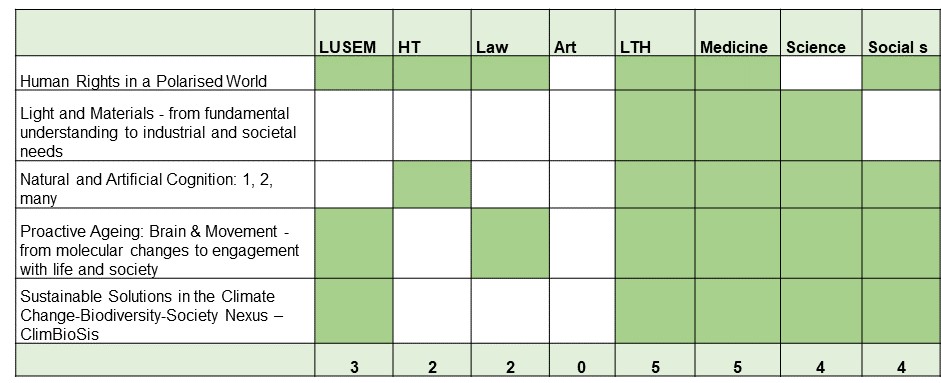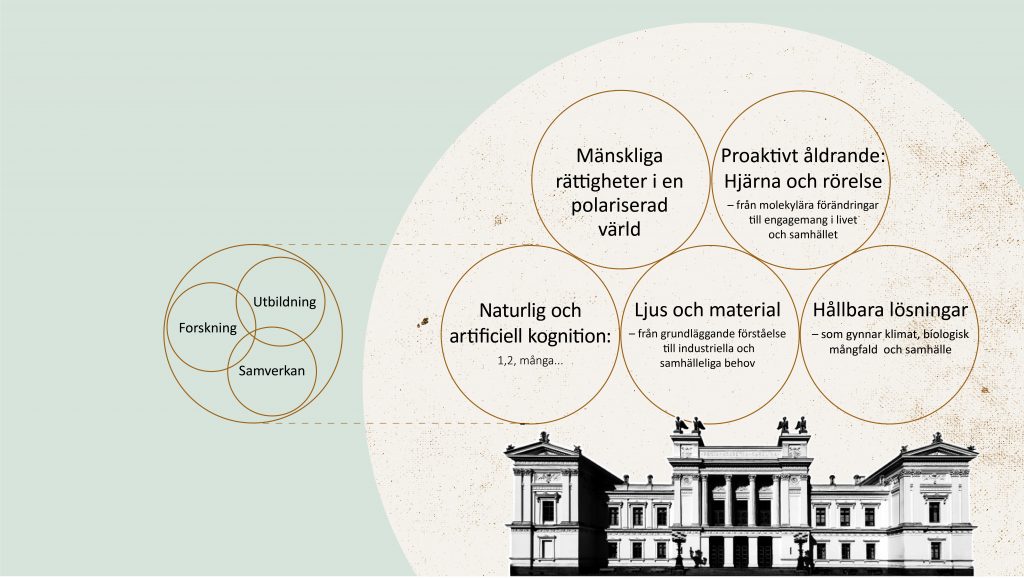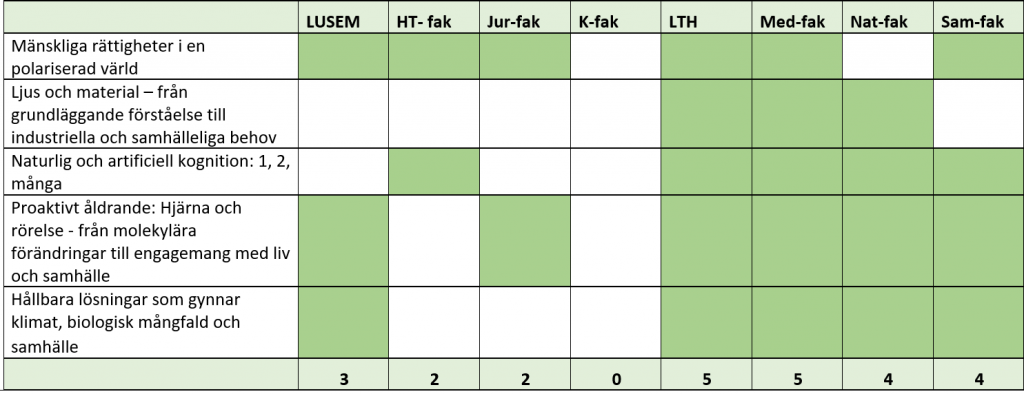Summary
The news that Lund University has five profile areas has generated a lot of interest. Since the information at this stage has been rather limited, I will answer the three most common questions here. More information will be published about the profile areas after the summer holidays.
In Swedish below.
Question 1: What will the profile areas do?
All five profile areas are based on excellent research, with a distinct profile compared to what is done at other universities in Sweden and internationally. They all have ambitious plans for the future for which they utilise the breadth of Lund University. They have extensive collaboration with external partners and their research is linked to present education complemented with plans for new courses.
Below the focus of each profile area is summarised in a couple of sentences.
Human Rights in a Polarised World
The profile area will consolidate and dynamically develop Lund University’s standing as a unique hub for cross-disciplinary human rights research and education. As a field of study, human rights addresses challenges related to democracy, civil society, conflicts, disasters,
migration, health, gender, religion and new technologies. In an increasingly polarised world, where democracy is threatened by authoritarianism, and violence and inequalities are widespread and growing, the concerted effort at Lund University to study and promote human rights as effective tools for justice is more urgent than ever.
Light and Materials – from fundamental understanding to industrial and societal needs
The profile area will harness the recent dramatic progress in our ability to measure and control light and materials, to substantially improve our understanding of the natural world and use this to create technologies that will enable a sustainable and healthy society. In Lund, we have a unique opportunity to work in this area with the combined expertise and facilities gathering at Science Village Scandinavia and around.
Natural and Artificial Cognition: 1, 2, many
The profile area will develop an understanding of cognition for natural and artificial systems and develop artificial cognition in terms of software and systems. Cognition means the process of sensing, processing, and sharing information, leading up to observable behaviour. The profile area will also aim at understanding the complex consequences of collective behaviour for both the natural and artificial entities and address challenges connected with the large-scale automation of society.
Proactive Ageing: Brain & Movement – from molecular changes to engagement with life and society
The profile area will develop transdisciplinary health promotive approaches towards proactive ageing, focusing on maintaining cognitive functions and musculoskeletal health as prerequisites for activity and participation. The profile area will determine measures for an early identification of individuals at risk, using both economic, social and biological markers, and aim to identify and utilise windows of opportunity for proactive preventive measures to improve health and quality of life for future generations of older people.
Sustainable Solutions in the Climate Change – Biodiversity – Society Nexus – ClimBioSis
The profile area will focus on ecosystem-based approaches which offer an integrative and systemic framework that contends that mobilising ecosystem processes for climate mitigation and adaptation can create co-benefits for biodiversity and societies. Translating such approaches into viable social and political strategies requires that they are underpinned by science able to identify and quantify relevant trade-offs and synergies. These relationships critically depend on human and societal interactions.
Question 2: Which faculties are involved in which profile areas?
Typical for the five profile areas is that several faculties are involved (see Figure 1 below). All faculties, except the Faculty of Fine and Performing Arts, are participating in at least two profile areas and the Faculty of Engineering, LTH and the Faculty of Medicine, are involved in all five profile areas The University Management is committed to work with the profile areas in order to ensure that researchers from the Faculty of Fine and Performing Arts are included in at least one profile area, in order to utilise this unique expertise at Lund University.

Figure 1. The involvement of the faculties in the five profile areas.
Question 3: Who are the contact persons for the profile areas?
Below is a list of contact persons for each profile area. However, it should be noted that all profile areas are developed by and organised around groups of strong researchers rather than just one individual.
“Human Rights in a Polarised World”, contact person is professor Lena Halldenius (lena.halldenius@mrs.lu.se).
“Light and Materials – from fundamental understanding to industrial and societal needs”, contact person is professor Tönu Pullerits (tonu.pullerits@chemphys.lu.se).
“Natural and Artificial Cognition: 1, 2, many”, contact person is professor Kalle Åström (karl.astrom@math.lth.se).
“Proactive Ageing: Brain & Movement – from molecular changes to engagement with life and society”, contact person is professor Susanne Iwarsson (susanne.iwarsson@med.lu.se).
“Sustainable Solutions in the Climate Change-Biodiversity-Society Nexus – ClimBioSis”, contact person is professor Henrik Smith (henrik.smith@biol.lu.se).
/ Per Mickwitz, Pro vice-chancellor
Mer information om universitetets fem profilområden

Nyheten om att universitetet har fattat beslut om fem profilområden, har väckt stort intresse. Här kommer lite mer information om de fem profilområdena som svar på de vanligaste frågorna: Vad ska profilområdena göra? Vilka fakulteter är involverade? Och vilka är kontaktpersonerna?
Mer information om profilområdena kommer att publiceras på denna blogg under hösten.
Fråga 1: Vad ska profilområdena göra?
Samtliga fem profilområden bygger på excellent forskning med en tydlig profil jämfört med vad som görs vid andra lärosäten i Sverige och internationellt. De har alla ambitiösa framtidsplaner och drar nytta av Lunds universitets bredd. Profilområdena har också god samverkan med externa samarbetspartners och deras forskning är kopplad till befintlig utbildning, kompletterat med planer på nya kurser.
Här följer en kort sammanfattning av varje profilområde:
Mänskliga rättigheter i en polariserad värld
Profilområdet kommer att befästa och dynamiskt utveckla Lunds universitets ställning som ett unikt nav för tvärvetenskaplig forskning och utbildning om mänskliga rättigheter. Inom forskningsområdet Mänskliga rättigheter ingår frågor relaterade till demokrati, civilsamhälle, konflikter, katastrofer, migration, hälsa, genus, religion och ny teknik. I en alltmer polariserad värld, där demokratin hotas av auktoritära maktsystem och våld och där ojämlikheterna är stora och växande, är Lunds universitets kraftsamling för att undersöka och stärka mänskliga rättigheter som effektiva verktyg för rättvisa, mer angelägen än någonsin.
Ljus och material – från grundläggande förståelse till industriella och samhälleliga behov
Profilområdet kommer att dra nytta av de senaste spännande framstegen i vår förmåga att mäta och kontrollera ljus och material, för att väsentligt förbättra vår förståelse för den naturliga världen. Med hjälp av denna förståelse ska man skapa teknik som möjliggör ett hållbart och hälsosamt samhälle. Lunds universitet har en unik möjlighet att forska inom detta område tack vare den samlade kompetens som finns och de anläggningar som samlas i och runt Science Village Scandinavia.
Naturlig och artificiell kognition: 1, 2, många
Profilområdet kommer att utveckla kunskap om kognition hos naturliga och artificiella system och utveckla artificiell kognition i form av programvara och system. Med kognition menar vi här de processer inom perception, kunskapsbearbetning och kommunikation som leder fram till observerbart beteende. Detta profilområde har också som syfte att förstå de komplexa konsekvenserna av kollektivt beteende hos naturliga och artificiella enheter samt att ta itu med de utmaningar som kan uppkomma i samband med storskalig automatisering av samhället.
Proaktivt åldrande: Hjärna och rörelse – från molekylära förändringar till engagemang i livet och samhället
Profilområdet kommer att utveckla tvärvetenskapliga och gränsöverskridande hälsofrämjande strategier för proaktivt åldrande, med fokus på att upprätthålla kognitiva funktioner och muskuloskeletal hälsa som förutsättningar för aktivitet och delaktighet. Profilområdet kommer att fastställa faktorer för tidig identifiering av individer i riskzonen, med hjälp av ekonomiska, sociala och biologiska markörer. Målet är att identifiera och utnyttja möjligheter för proaktiva förebyggande åtgärder för att förbättra hälsa och livskvalitet för kommande generationer av äldre.
Hållbara lösningar som gynnar klimat, biologisk mångfald och samhälle
Profilområdet fokuserar på de möjligheter till synergier och risk för konflikter som finns mellan klimatlösningar och åtgärder för att bevara biologisk mångfald, och vilka konsekvenser och möjligheter som sådana lösningar har för samhället och människors välbefinnande. Forskarna ska fokusera på ekosystembaserade lösningar som mobiliserar naturliga ekosystemprocesser, för att samtidigt hantera klimatförändringar och förlust av biologisk mångfald och de möjligheter sådana lösningar medför när det gäller att skapa ett socialt och ekonomiskt hållbart samhälle.
Fråga 2: Vilka fakulteter är involverade i vilka profilområden?
Typiskt för de fem profilområdena är att flera fakulteter är inblandade (se figur nedan). Alla fakulteter, utom Konstnärliga fakulteten, deltar i minst två profilområden, LTH och Medicinska fakulteten är involverade i samtliga fem profilområden. Universitetsledningen ska tillsammans med profilområdena arbeta för att forskare från Konstnärliga fakulteten också inkluderas i minst ett profilområde, för att tillvara denna unika kompetens vid Lunds universitet.

Fråga 3: Vilka är profilområdenas kontaktpersoner?
Nedan listas varje profilområdes kontaktperson. Men bakom varje profilområden står en grupp av starka forskare, snarare än bara en enskild individ.
“Mänskliga rättigheter i en polariserad värld”, kontaktperson är professor Lena Halldenius (lena.halldenius@mrs.lu.se).
“Ljus och material – från grundläggande förståelse till industriella och samhälleliga behov”, kontaktperson är professor Tönu Pullerits (tonu.pullerits@chemphys.lu.se).
“Naturlig och artificiell kognition: 1, 2, flera”, kontaktperson är professor Kalle Åström (karl.astrom@math.lth.se).
“Proaktivt åldrande: Hjärna och rörelse – från molekylära förändringar till engagemang med liv och samhälle”, kontaktperson är professor Susanne Iwarsson (susanne.iwarsson@med.lu.se).
“Hållbara lösningar i klimatförändringarna – biologisk mångfald – society nexus – ClimBioSis”, kontaktperson är professor Henrik Smith (henrik.smith@biol.lu.se).

